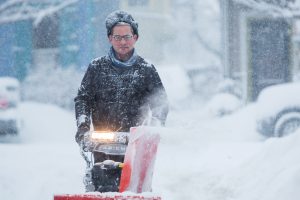
By Suzannah Gonzales
CHICAGO (Reuters) – Frozen Arctic winds brought record-low temperatures across much of the U.S. Midwest on Wednesday, unnerving residents accustomed to brutal winters and keeping them huddled indoors as offices closed and even mail carriers halted their rounds.
Classes were canceled Wednesday and Thursday in many cities, including Chicago, home of the nation’s third-largest school system, and police warned of the risk of accidents on icy highways.

Man blows snow during a winter storm in Buffalo, New York, U.S., January 30, 2019. REUTERS/Lindsay Dedario
In a rare move, the U.S. Postal Service appeared to temporarily set aside its credo that “neither snow nor rain … nor gloom of night” would stop its work: it halted deliveries from parts of the Dakotas through Ohio.
Temperatures in parts of the Northern Plains and Great Lakes plunged to as low minus 42 Fahrenheit (minus 41 Celsius) in Park Rapids, Minnesota, and minus 31F in Fargo, North Dakota, according to the National Weather Service. The frigid winds were bound for the U.S. East Coast later on Wednesday into Thursday.
Andrew Orrison, a meteorologist with the service, said the some of the coldest wind chills were recorded in International Falls, Minnesota, at minus 55F (minus 48C). Even the South Pole in Antarctica was warmer, with an expected low of minus 24F (minus 31C) with wind chill.
The bitter cold was caused by a displacement of the polar vortex, a stream of air that normally spins around the stratosphere over the North Pole, but whose current was disrupted and was now pushing south.
An Illinois police department found a fictitious cause for the icy blast, posting on Facebook that its officers had arrested Elsa, the frosty character from the Disney movie “Frozen,” for bringing the arctic air to the Midwest.

Aftermath of an accident in Grand Rapids, Michigan, U.S., January 29, 2019 in this picture obtained from social media. Picture taken January 29, 2019. JASON COFFELT/via REUTERS
The McLean Police Department shared a staged photo of officers putting a woman dressed in a blue princess gown in pink handcuffs and escorting her into a police car.
Officials opened warming centers across the region, and in Chicago, police stations were open to anyone seeking refuge from the cold. Five city buses were also deployed to serve as mobile warming centers for homeless people.
The Chicago Police Department said that at most, it could encourage people to get out of the cold.
“But we will never force someone,” police officer Michael Carroll said.
At least five deaths relating to cold weather have been reported since Saturday in Iowa, Indiana, Illinois, Wisconsin and Minnesota, local media reports said.
Hundreds of flights, more than half of those scheduled, were canceled on Wednesday out of Chicago O’Hare and Chicago Midway international airports, according to the flight tracking site FlightAware.
Train service Amtrak said it would cancel all trains in and out of Chicago on Wednesday.
Most federal government offices in Washington D.C. opened three hours late on Wednesday due to the frigid weather already impacting the area.
(Reporting by Suzannah Gonzales, additional reporting by Rich McKay in Atlanta, and Gina Cherelus and Jonathan Allen in New York; Editing by Scott Malone and Bernadette Baum)








